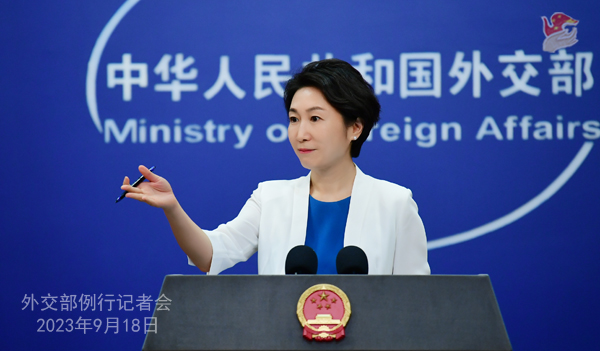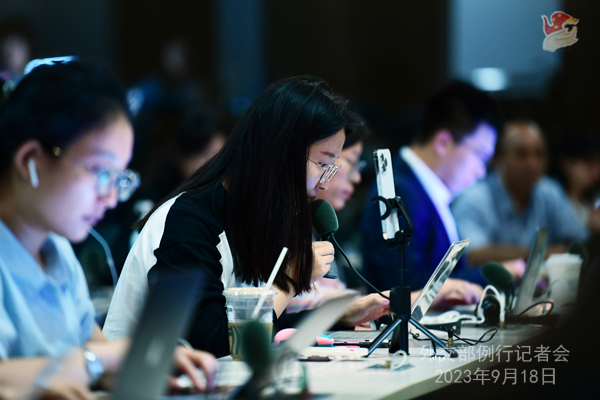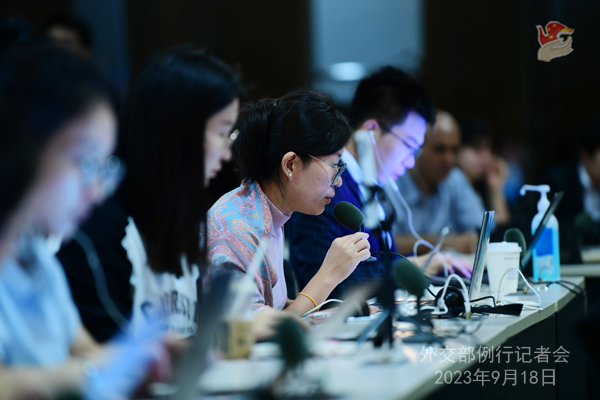| Foreign Ministry Spokesperson Mao Ning’s Regular Press Conference on September 18, 2023 |
| 2023-09-18 17:14 |
|
CCTV: Can you share more about the 18th round of China-Russia strategic security consultation? What is China’s expectation for the consultation? Mao Ning: China and Russia are each other’s biggest neighbors and comprehensive strategic partners of coordination for a new era. Both countries are permanent members of the UN Security Council and major emerging economies. The two countries have maintained close communication on major issues of mutual interest that have strategic and overarching significance. Director Wang Yi’s trip to Russia is a regular activity within the framework of the strategic security consultation mechanism and aimed at delivering on the important common understandings between our two countries’ heads of state, advancing bilateral ties, and having in-depth communication on major issues that bear on the strategic security interests of the two countries. CCTV: In a designation submitted to the US Congress on September 15, President Biden identified China as a “major drug source country”. What’s China’s comment? Mao Ning: The US’s identification has no basis in facts. This is a malicious smear against China. We firmly oppose it and have made serious démarches to the US. The Chinese government has always been serious about fighting drugs. To date, China has scheduled 456 anesthetic and psychotropic drugs and two entire classes of substances. We are one of the countries that have scheduled the biggest number of substances and exercise the strictest control on drugs. China has listed 38 types of controlled precursor chemicals—14 more than those regulated by the United Nations. The narcotics control authorities have put in place a comprehensive and dynamic supervision mechanism for all stages of precursor chemical management. Those are exemplary efforts on global drug governance. China has the strictest drug control policy in the world and enforces it in the fullest way. Our efforts are widely recognized by the international community. In contrast, the US, with 5 percent of the world’s population, consumes 80 percent of the opioid produced in the world—which makes the US a black hole and source of problem for global drug control. The US is the single largest major drug demand country and is in no position to wag its finger at China’s counter-narcotics efforts. The incompetence and ineffective control is the true cause of the pervasive drug problem in the US, and the fundamental solution is to reduce domestic demand. We urge the US to stop blaming and smearing China and do things in ways that are conducive to cooperation with China, not otherwise.
Shenzhen TV: A recent New York Times article claimed that China used artificial intelligence technology to generate disinformation about the wildfires in Hawaii, saying the disaster was a result of a secrete “weather weapon” tested by the US, and spread the false posts across the internet, so as to sow discord in the US. Can you confirm this? Mao Ning: This report is not factual at all. The theory about “weather weapon” came from US media first. Some Chinese media outlets and we-media accounts did nothing more than citing or re-posting those reports. To say they “made up or spread disinformation” is completely unfounded. If anyone was “making up or spreading disinformation”, it would be The New York Times, not them. As a matter of fact, the people in China and in the US never sat idly by and watched when either side was hit by disasters. During the early days of the outbreak of COVID-19, US businesses and people actively donated money and materials to help the Chinese people. Later on, as the pandemic spread in the US, Chinese local groups and the public immediately raised materials and sent them all the way across the ocean to over 20 US states and cities, which was highly appreciated by people in the US. In August last year, an American teacher working in China’s Southwest University carried chain saws to help fight wildfires in Chongqing. His brave deed was widely acclaimed by Chinese people online. After the devastating wildfires broke out in Hawaii, China immediately extended sympathies and expressed readiness to provide help as needed. Those are the true stories about sub-national and people-to-people exchanges between China and the US. We urge relevant US media outlet to be truthful, objective and neutral in its reporting, and stop spreading disinformation against China. China News Service: In an address to the Summit of the Group of 77 and China that just concluded, UN Secretary-General António Guterres said that he counts on the Group and China, who have long been champions of multilateralism, to fight to champion a system that is rooted in equality and delivers for all humanity. How does China view the outcomes of this summit? Mao Ning: First I would like to offer my congratulations on the full success of this summit, which contributes significantly to enhancing solidarity and cooperation among developing countries to jointly address challenges. Li Xi, President Xi Jinping’s special representative, Member of the Standing Committee of the Political Bureau of the Communist Party of China Central Committee and Secretary of the Central Commission for Discipline Inspection, attended the summit and put forward a three-point proposal on cooperation between the G77 and China: first, we must stay true to the original aspiration of the G77 for independence and greater collective strength through unity, reject bloc confrontation and the Cold War mentality and join hands to maintain world peace and tranquility; second, we must advocate equity, justice and inclusiveness and strengthen the voice and representation of developing countries; third, we must pursue development, revitalization and win-win cooperation and work to ensure that no developing country will be left behind or left out in the development of new technologies and industries. The summit adopted the Havana Declaration. It stresses the importance of solidarity and cooperation on the basis of extensive consultations, joint contributions and shared benefits, which can bring huge gains to all countries and all parts of the world in building a community of shared future for humankind. It emphasizes equality, justice and the need for a more inclusive and coordinated approach to global financial governance, rejects technological monopolies and other unfair practices that hinder the technological development of developing countries, and calls upon the international community to foster an open, fair, inclusive and non-discriminatory environment for scientific and technological development. China is the largest developing country in the world and a member of the Global South. We stand ready to work together with G77 members to build a Global South community with a shared future, and usher in a new era of common development.
China Daily: It was reported that President of the Central American Parliament Amado Cerrud will lead a delegation to China in the coming days. Can you confirm this? Mao Ning: At the invitation of Chairman of the National People’s Congress Standing Committee Zhao Leji, President of the Central American Parliament Amado Cerrud will lead a delegation to China from September 19 to 23. On August 22 this year, the Central American Parliament adopted the resolution to revoke the “permanent observer status” of the so-called “Legislative Yuan” of the Taiwan region and accept the National People’s Congress of China as a permanent observer. China welcomes and commends the resolution. This again shows that the one-China principle represents the unstoppable trend of the times and has the overwhelming support of the people. China stands ready to develop friendly cooperation with the Central American Parliament on the basis of the one-China principle. Reuters: Huawei has met with Taliban interior ministry officials. Is China hoping to encourage cooperation between Chinese companies with Afghanistan on security matters? And is the Chinese government willing to cooperate with Taliban authorities on counter-terrorism plans, including surveillance? Mao Ning: I have no information on what you mentioned. AFP: The Taiwan authorities claimed that they had detected the continued activity of 103 People’s Liberation Army warplanes near the island by 6 o’clock this morning, of which dozens crossed the “median line” in the Taiwan Strait. Can you further explain these military activities? Mao Ning: First of all, this is not a question about foreign affairs. I suggest you ask competent Chinese authorities for specifics. Let me say that Taiwan is part of China’s territory. There is no so-called “median line” in the Taiwan Strait. Bloomberg: Can you tell us if President Xi Jinping is planning to attend the APEC summit in the US in November? Mao Ning: We value APEC’s role as an important multilateral economic cooperation mechanism and stand ready to work with other parties for a fruitful APEC summit. If there is any information about China’s participation, we will release it in due course. NHK: Could you share more about the talks between the Chinese and Russian foreign ministers to be held tonight, for example, the issues to be discussed or the theme of the talks, and China’s expectations? Mao Ning: We will release information about the upcoming exchanges with Russia in due course. Please check back for updates.
|
 | ||||||||||||
 | ||||||||||||
|



